PRESERVING A MILITARY LEGACY FOR FUTURE GENERATIONS
The following Reflections represents GySgt Dan Edick’s legacy of his military service from 1978 to 2000. If you are a Veteran, consider preserving a record of your own military service, including your memories and photographs, on Togetherweserved.com (TWS), the leading archive of living military history. The following Service Reflections is an easy-to-complete self-interview, located on your TWS Military Service Page, which enables you to remember key people and events from your military service and the impact they made on your life. Start recording your own Military Memories HERE.
Please describe who or what influenced your decision to join the Marine Corps.

I am a fraternal twin. I knew my parents couldn’t afford to send us both to college, and I personally didn’t want to go. I felt as though my whole life had been spent in school already, and I wanted to do something different.
My father and several uncles served in the military. Some of them retired from the service. I respected them for serving and decided that I wanted to serve my country. My original choice was the Army, so I set an appointment with the Recruiter while a sophomore in high school. They showed no interest in me because of my age, so I left. The following year, I tried again. I sat with the Army and Air Force Recruiter. The Army didn’t impress me as much as the Air Force. The A.F. Recruiter said I was still too young and to come back in another year.
As I was leaving, I was greeted by a Marine Recruiter. He wanted me to give him a chance. All I knew about Marines at the time was from watching movies and hearing stories that sent chills up my spine. I explained that I was underage and just wanted information so I could make my decision before I graduated. He saw this as fair. He set me up with a junior Marine program located at a Marine Reserve near my house. We learned how to march, run in formation, first aid, how to make a rope bridge, and basic essential subjects. The more I went, the more I liked it. I felt that the Marines we worked with were straightforward and honest when asked questions about their life as a Marine. I signed up with the delayed entry program, with a ship date of 7 months later when I graduated.
At the time, I anticipated being in only four years. After signing up, I found it hard to get a hold of my Recruiter. He never returned phone calls and never showed up at the junior Marine training. Another Recruiter heard about this from other Marines at the training center. Mike Rufner took me under his wing until my ship date.
Whether you were in the service for several years or as a career, please describe the direction or path you took. What was your reason for leaving?

I mainly stayed within the Infantry or Infantry-related jobs in the Marine Corps.
I retired from the Marine Corps, and cutbacks and politics played a significant role.
If you participated in any military operations, including combat, humanitarian and peacekeeping operations, please describe those which made a lasting impact on you and, if life-changing, in what way?

UNITAS XXVI (United American States) was a unique unit. We had around 200 Marines on board the USS Saginaw. We were the 4th Marine unit to participate, though the Navy had been doing this for years…thus the Roman numerals designating how many times the unit visited. On the Marine side, we had one Rifle Platoon, a Weapons Platoon, an STA, Recon and Anglaco Platoon, a headquarters section, and an Amtrak Plt.
Each Marine on the Infantry side of the house in the Weapons Platoon was multi-trained within their own MOS. For example, every 0331 Machine Gunner had to be knowledgeable in using the M60 and the 50 Cal. Every 0341 Mortar Man had to be able to work with both the 60s and 81 mortars. Every Assault man had to be able to instruct and shoot the Dragons, Tows, bunker busters, and Laws. Everyone was trained to give classes on their specialties working through translators. Static displays were done with placards in Spanish, French, and Portuguese, depending on the language used in the Countries we were in that day.
Every year the unit changes the Roman Numeral to reflect another trip with UNITAS, and I stayed to participate with UNITAS XXVII. Our Commanding Officer was a Major, and the senior enlisted was a 1st SGT. On the Marine side of the house, the next person in the chain of command was the Commanding Officer of 2nd Mar Div, Camp Lejuene. I can only assume that he reported to someone connected to the OAS (Organization of the American States). We brought back both Officers and Enlisted to the States from the Countries we visited to get further training in the School of America. Many in the UNITAS unit were not American Citizens but were translators in Countries they could translate for the purpose of weapons training and training Operations.
WATC 85 (West Africa Training Cruise) was a training and a humanitarian mission. At the same time, money was raised via music bands, Band-Aid, and the USA for Africa, in the early ’80s. It was WATC that delivered tons of food around West Africa. We did a live-fire shoot and a few static displays, but no real training in Africa.
After finding tunnels along the DMZ, our unit was sent to South Korea as a contingency force while the intercept tunnels were dug. I do not believe they found anything this time, but we had an awesome time training with the ROK Marines.
Desert Shield, Task Force Grizzly. 24th Marine’s Regimental Instructor for Offensive Combat before the ground offensive. POW handling working with translators to provide security, so we could feed them and give medical assistance to the wounded without incidents.
Desert Storm, Task Force Ripper. POW handling. Worked with Command Historian in the production of classified and unclassified videos related to the Gulf War.
I taught and trained with 10 Foreign Marine Corps and a Scottish Army unit.
Visited and/ or trained with, represented by over 30 Countries. Not including the Coalition forces as a whole in the Persian Gulf.
Did you encounter any situation during your military service when you believed there was a possibility you might not survive? If so, please describe what happened and what was the outcome.
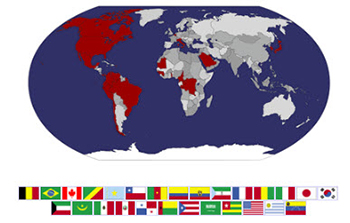
Direct shootings, missile attacks, boobytraps, minefields, tripwire, car bombs, IEDs.
When we traveled with UNITAS, …
Hugo Chavez was President of Venezuela, a Socialist Country back then too. We had liberty in Caracas but were restricted to only a specific area. Their military was everywhere and well-armed, and we were not allowed to have weapons off the ship. We only trained with the Venezuelans in Vieques, Purto Rico, and we did not visit after training the following year.
General Noriega was in charge of Panama. He was working with drug Cartels and protecting their drug supplies for those that paid him. For those that know the story, the U.S. invaded and captured him a few years later.
Colombia had a lot going on with the drug trade, Cartels, FARC, and the Shining Path…but they were not giving up!
Ecuador was leaning pro-Castro at the time. I do not remember if they were a Socialist Country, but nothing on the ground other than pictures of Fidel Castro were evident in certain businesses.
Peru had a lot of action dealing with the Shining Path terrorist/ Guerrilla organization. A car bomb outside of the Police station and something they blew up caused a power outage while we were on liberty. The 2nd year we visited, we were restricted to the Peruvian Marine base. The Shining Path changed its tactics and followed Peruvian Marines home after they left the base. They assassinated them and terrorized their families.
Chile was run by General Pinochet, a dictator who used death squads to go after anyone that opposed him. The Military presence was noticeable, and pictures of missing people were posted on poles and buildings everywhere I went.
I met some incredible people in Africa. In many of the countries I visited, the Governments, law enforcement, and Military were obviously corrupt to the bone. Coups were very common. I do not remember which country it was, but on our way to Africa, via ship, the country changed hands over three different times before we got there. After we left, Zaire had civil wars and warlord conflicts, resulting in millions killed. It is now known as the Democratic Republic of Congo, but the fighting continues today.
Of all your duty stations or assignments, which one do you have fondest memories of and why? Which was your least favorite?
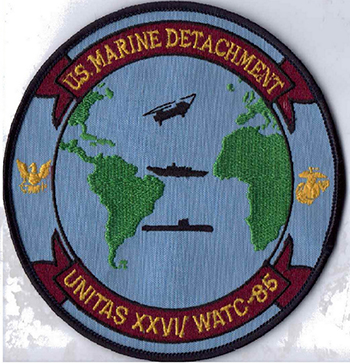
My favorite unit Is a hard one to choose, and I would have to say UNITAS XXVI and UNITAS XXVII. Training and training with Central and South American forces was an experience that was unique and full of knowledge. Learned something about foreign cultures, corrupt governments, real-life dictators, death squads, and each country’s history.
My worst experience was half the countries I visited in West Africa. Corruption within their military and law enforcement was open and bold. The people were friendly and curious, yet, they lived in constant fear.
From your entire military service, describe any memories you still reflect back on to this day.
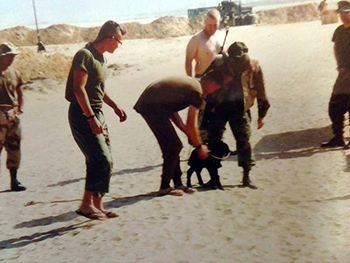
We met people willing to talk to you without fear of being punished, learning about differences in our cultures and histories. We saw things of interest, such as the Machu Picchu, the aftermath of major earthquakes, and meeting Russians and Chinese during the Cold War. Reading about Socialism, Fascism and Communism paints a watered-down version of the real thing.
What professional achievements are you most proud of from your military career?
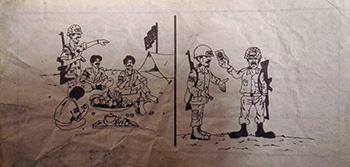
I finally unpacked a lot of things I acquired in my travels. I put together a notebook with various letters and written awards. It is presently 80 pages and growing. I have a patch for running 15 miles on an Edson Range run. Page 11 entry for force marching across the Panama Canal. A patch from UNITAS XXVI/ WATC. Very rare! Foreign uniforms. Hand-made items from a variety of Countries. I eventually want to be able to display everything in cabinets in my Garage, only with an alarm system, of course.
My goal is to copy all my awards eventually and put them on my TWS profile page. This way, I will have a backup in case I lose anything. It will also be a form of archives for my family and friends so that they will have my history of Service in the Marine Corps.
Of all the medals, awards, formal presentations and qualification badges you received, or other memorabilia, which one is the most meaningful to you and why?
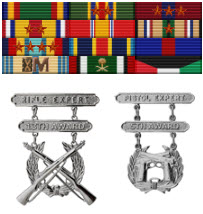
All my letters, plaques, and letters of recognition from all my units mean a lot to me. People actually spent the time to write them and push them through. It means that I had a positive impression on a lot of Marines. I moved around a lot within the units I was assigned to. I also carried additional MOSs that would require me to delegate authority in my absence.
While working an account for a Battalion, there was a surprise inspection. The account was sensitive in nature. A Bn C.O. and Gunny were relieved before I was brought in. I was able to correct flaws and discrepancies. The inspection team spent two days looking, yet we got dinged on minor things out of our control. I was able to read a note that was written for me by the inspection team. I never received a paper version. I would have to say that was one of the most memorable awards.
Which individual(s) from your time in the military stand out as having the most positive impact on you and why?
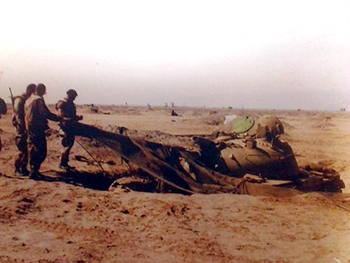
Sgt Rufner. Last I knew, he was a GySgt. He took over as my Recruiter when I joined. He later worked with a reserve unit I was with, as an I & I, with the S3. All of the Vietnam Veterans from the first years of service were the reason I stayed in and became successful as a grunt. My family and their support during my career.
List the names of old friends you served with, at which locations, and recount what you remember most about them. Indicate those you are already in touch with and those you would like to make contact with.
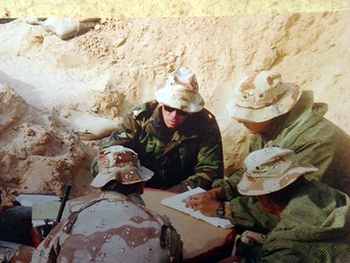
Too many to remember without a cheat sheet.
Can you recount a particular incident from your service, which may or may not have been funny at the time, but still makes you laugh?
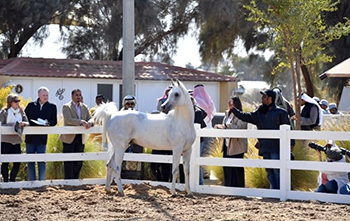
We were remembering cave parties with Mojo kits in Okinawa. The Platoon Sgt would tell us to stop the party when the tide came in. For months we thought it was a curfew. It turned out that, by the time the water made it to the mouth of the cave, all of our dry areas were underwater.
During the Gulf War, it seeing and feeding the “White Horse” in the middle of no man’s land in Kuwait during the ground offensive. I later learned that the Iraqis tried to hide their tanks inside a large building that housed many horses. We bombed it, and this horse took off, and I assumed it was shell shock. Many people who saw the horse saw it as a sign of something biblical. He must have come a long way since there were no buildings in sight.
In Peru, the Peruvian Marines set up a perimeter around us for the night. They allowed this young kid in with this huge potato sack. When he got to us, we found out that he was trying to sell us live chickens and guinea pigs. We got a chicken and took a pass on the guinea pigs. We spent over an hour plucking feathers and trying to cook it with heat tablets. On top of that, we had to split it up between 4 people.
I was with B Co. 1/7 in Okinawa around 1982. We needed to recommend Marines for a meritorious Cpl board coming up. We were going to send 3. I instructed the unit leaders to quiz these men every chance they get constantly. One of the Marines transferred from Amtracs to be a grunt. I advised these Marines to repeat the question and answer smartly and confidently. If they did not know the answer, reply that you do not know but will find out immediately after the board. I also warned them about trick questions that they might be asked. The Amtrac/grunt told me that he thought he had this in the bag. He told me that he didn’t get asked all the questions, and everyone was smiling when he was told he was done. After getting my butt handed to me by the 1st Sgt, he told me that this Marine was definitely not ready to be sent to a meritorious board. The Marine fumbled through the first set of questions and then was asked what SMEAC was to him. After hesitating, he smiled at the board members and then replied.” SMEAC, the sound of a round ricocheting off of a rock”…
What profession did you follow after your military service and what are you doing now? if you are currently serving, what is your present occupational specialty?
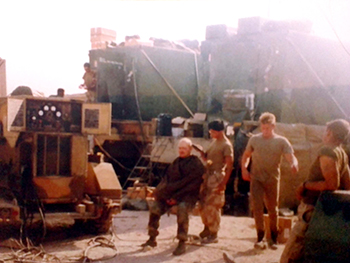
I worked with alarm Companies for at least nine years or more. Working with covert cameras was, by far, the coolest part of the job. Roughnecking was another rewarding job, and it was the most money I had ever made. It was a lot like being a grunt. Dirty all the time, long hours, the camaraderie was there, just not the same as I found in the Corps.
I spent over 15 months being treated for Tuberculosis during the investigations over the V.A. scandals in 2015. Isolation meant spending three months alone. I almost lost everything due to a DOH nurse and people within the V.A. that were supposed to help. Contacting my Congressman and letting them verify my situation allowed me to go back to work and get placed on disability.
I last worked at the Appleton, Wisconsin airport working Security for Gulfstream, a branch of General Dynamics.
I finally got my reserve pension. I am waiting to see what is happening with this COVID 19 B.S. I want to go back to work, but with a liveable wage for real money.
What military associations are you a member of, if any? what specific benefits do you derive from your memberships?

I was a member of the local American Legion and a member of the Mohican Veterans. It caused a lot of problems at home. I would be gone for 2-3 weeks, then be expected to do flags, volunteer for funeral detail, or run a booth somewhere. It became a waste of time working with the Legion.
With over 200 members, I seemed to be the new Private that was expected to listen to B.S. war stories from one-timers. One hour of meetings gets turned into 3 hours without much getting done. I would show up to functions and either be the only one there, or just a few would show up.
While being treated for TB, my wife and daughter had to move out because they were negative. My power was shut off and stayed that way for over five months. The Legion sent Reps from Milwaukee to see if they could help. Had my daughter stayed, I could have a furnace and a new stove…
My point was that I was the Veteran, not my daughter. The reps noticed I had no power in my house and requested an investigation. As punishment, my utility bill in 2017 averaged over $500 a month ($580 to be exact, and we heated using a pellet stove) after the great storm. I moved out using a V.A. loan in June of 2018. My new house has a garage that is as big as my old house. I will probably lose the old house because I cannot afford two mortgages. I felt I was being punished for being a Vet or for being sick. Either way, I did not see any benefit in being a member.
In what ways has serving in the military influenced the way you have approached your life and your career? What do you miss most about your time in the service?
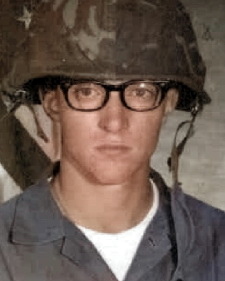
I seem to get along with people and groups of people who can’t get along. I motivate the people I work with and noticeable the ripple effect.
Based on your own experiences, what advice would you give to those who have recently joined the Marine Corps?
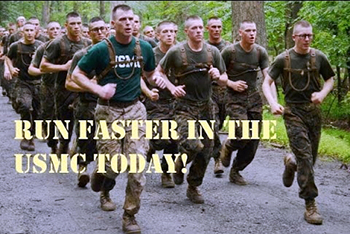
Don’t be like sheep, be yourself! Follow the crowd that you benefit from. Strive to learn something new as often as you can! Never forget where you once were as you move up the ranks. Do lots of running, to the point that you do not mind it at all.
In what ways has togetherweserved.com helped you remember your military service and the friends you served with.
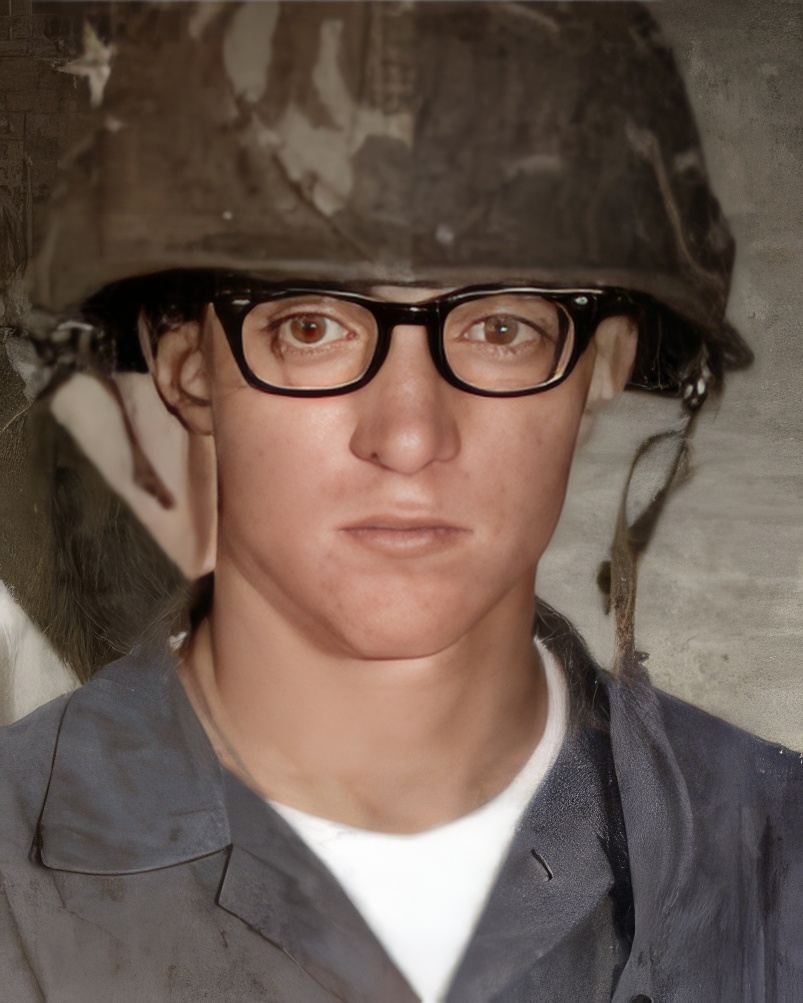
I still need to find rosters, albums, cargo pocketbooks, or anything with the names of people I served. Then, I will have something to pursue. I live paycheck to paycheck at the moment, and I am still digging out of a deep hole from an illness a few years ago.
In other words, I do not know what the future will be like, but I hope it is rewarding. I have just started getting my reserve pension, but it will not be enough to live on for a month. I anticipate that TWS will be a significant source for locating many of the Marines I have served with over the years. I moved around a lot. It would be interesting to know how many Marines still remember me.
PRESERVE YOUR OWN SERVICE MEMORIES!
Boot Camp, Units, Combat Operations
Join Togetherweserved.com to Create a Legacy of Your Service
U.S. Marine Corps, U.S. Navy, U.S. Air Force, U.S. Army, U.S. Coast Guard
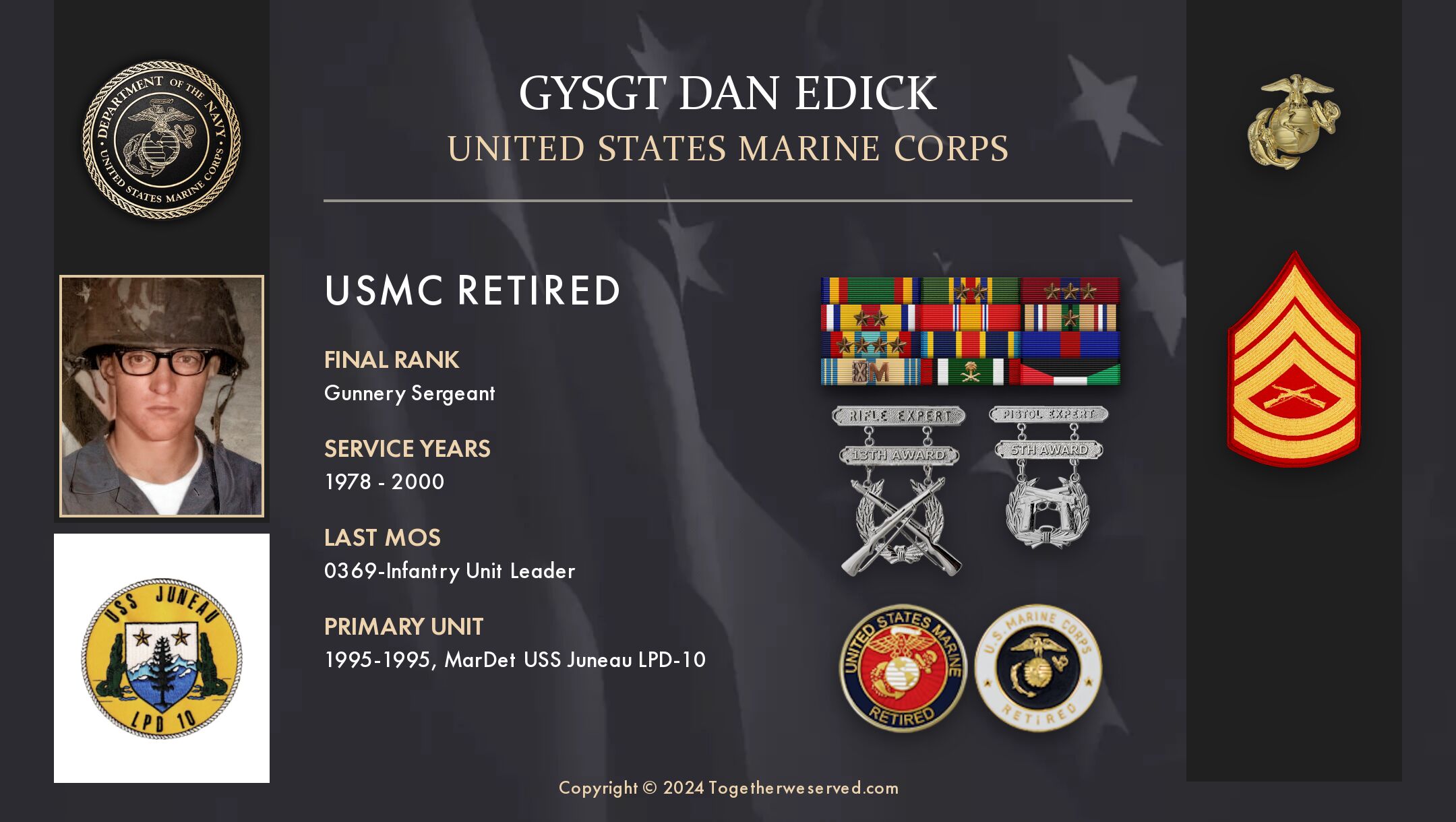
Thank you Corporal Edick.
You were Sergeant of the Guard at San Onofre, when I was waiting for Infantry Training School in 1982. Immediately from MCRD PISC to your influence toward ITS, then nearly immediately to the airport in Beruit. We were reaquainted for UNITAS XXVI/WATC.
Soon after Mother Green saw fit to, for my B billet to send me to MCRD PISC 2nd RCTBN, Co F. Semper Fi.